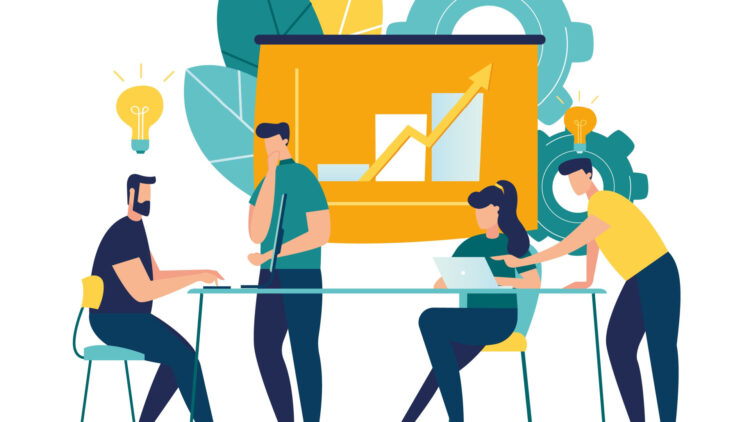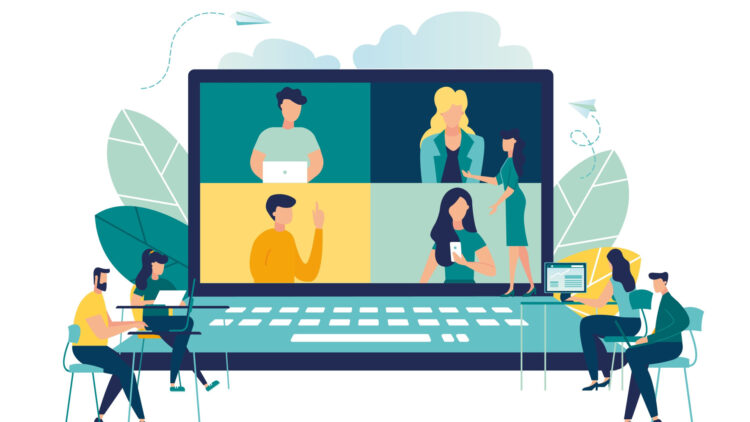How to Conduct and Solve Business Tasks With the Help of Workshops
As the head of an international company and, consequently, an international team of diverse specialists with different worldviews and skills, I often need to strengthen team spirit and improve the quality of their interaction. In my experience, one of the best ways to do this is not through joint retreats and educational courses (although these undoubtedly work well) but corporate workshops. This way, you help team members build trust with each other and level up their skills and productivity. In short, kill two birds with one workshop.
What is a workshop?

A workshop is just a type of training that involves gaining new knowledge and practical skills through collaborative learning.
From the outside, a workshop looks like this: a small group of people gather in one place (preferably offline) to find a solution to a specific problem within a certain time frame. For example, at my last workshop, we identified critical issues in the online education market and looked at ways to expand the industry. Workshops are an excellent platform for developing creativity and a field for experimentation, where all participants are involved in the learning process, so you can hold them in any business area, from education to IT.
Workshops usually last from one to three or more hours. Their main distinguishing feature is their practical orientation when all participants actively interact and work together to achieve a common goal. That’s why I prefer them out of all educational formats. Of course, webinars and lectures are also helpful, but workshops involve the interaction of participants with each other and are orientated towards actual results in the “here and now.”
Thus, I would emphasise the following advantages of workshops:
- Universality — workshops can be held anywhere and with anyone. You can organise them for employees of all levels — from managers and directors to lower-level specialists.
- Interactivity — you can combine different training formats if they encourage teamwork and aim to develop skills through communication and cooperation.
- Simultaneously developing soft and hard skills. Workshops allow employees to develop communication skills, upgrade professional competencies related to their tasks, broaden their horizons, practise strategy development, team management, etc.
- Sharing experience and expanding networking — such events contribute to creating and expanding a network of contacts among participants, which improves communication between teams and sometimes even between departments (if the workshop is for the entire company).
- Increased motivation and creativity — workshops develop a sense of responsibility for the company and the result. In the learning process, participants may have bright and inspiring ideas that will be useful to the business later.
However, my experience of workshops is primarily related to the business environment and entrepreneurship. Therefore, I will talk separately about what business problems you can solve through regular workshops:
- The optimisation of resources and business processes — with properly formulated tasks, workshops allow the establishment of many business processes, for example, production of goods or provision of services, personnel management, bookkeeping, developing a sales plan, preparing reports, etc. It is also a way to identify the strengths and weaknesses of your team and spend resources more economically on this basis.
- Staff training — such activities support employees’ professional development and contribute to their career growth.
- Adapting to change and developing flexibility. Workshops help employees and the company adapt to changing market conditions more quickly and easily because you can discuss trends, analyse the market, and prepare for changes within the workshop.
I want to note that workshops should be held at specific intervals so that a company and its employees can experience the above advantages. I, for example, have made it a habit to organise such events once a quarter. During this time, relevant issues that must be solved can accumulate, and the team can develop new connections or acquire new members. Moreover, it is desirable to alternate workshops of different types, and I’ll tell you what kind of workshops there are below.
Types of workshops and which one to choose

Depending on the purpose of your workshop, you can choose and run one of the following types:
- Training workshops
Such events primarily aim to teach employees new skills, transfer relevant knowledge, master professional competencies, and develop career and personal growth. You can dedicate workshops to developing leadership skills, emotional intelligence, and critical and operational thinking. For example, not so long ago, I conducted a series of workshops on how to work effectively with artificial intelligence as part of work tasks. It is a vivid example of a training workshop aiming to transfer knowledge and skills.
- Problem-based workshops
Such events occur when the company and its employees face a specific problem requiring an immediate solution. They bring specialised specialists, such as programmers, who work together to eliminate specific technical issues. First, they find out the problem’s causes, develop strategies for solving it, and then take concrete actions. In this case, teamwork will allow you to look at the situation from different angles and find the most optimal solution.
- Strategy sessions
Such workshops, first, involve analysing the company’s position and the current market situation. Then, several long-term strategies are developed, for example, on the company’s entry into the international market, attracting new audiences, increasing brand awareness, and so on, after which these strategies get discussed, and one is adopted. Remember I already gave you an example of one workshop dedicated to identifying the critical problems of the online education market? It aimed to improve the industry and Lectera‘s position internationally, so you can consider this workshop strategic.
- Creative workshops
This type of workshop provides maximum freedom of action, room for experimentation and realisation of the most daring ideas. Usually, a creative workshop occurs to find a non-standard way of solving a problem or to organise a kind of “brainstorming.” It can also be related, for instance, to rebranding and redesigning a company’s products, developing a logo, corporate identity, tone of voice of the brand and so on. A case in point is when I recently conducted a personal branding workshop at the annual UN Women’s Entrepreneurship Expo. It was a truly inspiring event that was a platform for flight of imagination and mutual sharing of creativity. So, this type of workshop is probably my favourite, and I heartily recommend it.
- Team building workshops
Some workshops are aimed solely at team building, strengthening team spirit, maintaining cooperation and mutual assistance. In the framework of such events, all employees come together, discuss relevant topics, share opinions, and compete in various skills, and everyone feels a significant part of a large professional community.
Conducting a Workshop: The Rules and Stages

Although workshops usually last no more than a couple of hours, the event requires careful preparation and planning. It is best to proceed in stages to make a workshop worthwhile:
Step 1: Define objectives and purpose
As mentioned, you must clearly articulate what you want to achieve with the workshop. Define your goal and the intermediate tasks along the way. Use this as a basis for choosing your formats and technologies. I advise preparing a written document to collect and systematise the initial data. In it, outline the global goal of the workshop, the smaller objectives and anything else you think is essential as supporting information.
Step 2: Identify workshop participants
Depending on the first point, you also need to select the participants of the upcoming workshop. Consider who the workshop is aimed at, who will find it particularly valuable to attend such an event, what specialists should be involved, etc. Nevertheless, don’t forget potential participants’ needs, expectations, and professional interests. For example, if you are organising a creative workshop, you can invite a wide range of specialists — from marketers and designers to programmers. If the workshop addresses a specific problem, such as a decline in sales, the event should primarily involve employees responsible for sales.
Step 3: Draw up the event programme
Only after the goals and objectives has been defined, the event format has been chosen, and interested specialists have been invited should you develop a programme for the upcoming workshop. You need to detail each activity that will take place at the event, such as speakers, masterclasses, Q&A sessions and so on. I advise you to take the timing of the planned activities very seriously so that the workshop will be dynamic and each participant will have an opportunity to speak up and clarify the points they don’t understand.
Step 4: Prepare materials
Prepare in advance documents and resources that will be useful for the participants in the process, e.g. presentations, manuals and guides, technical briefs for teamwork, etc. Try to think of everything in detail. My advice: don’t skimp on materials! Even if you have more than you need, the main thing is to avoid lacking them, which often happens due to inexperience and inattention during the preparatory stages.
Step 5: Choose a place and time
So, what’s complicated about this? Well, often, event organisers don’t choose the most convenient time for workshops or arrange them in uncomfortable spaces. Take care of the participants of your event and choose the most suitable time and place. It is crucial to ensure both convenience, comfort, and quality technical support, especially if you will be using multimedia materials for the workshop or organising it online.
Step 6: Appoint a facilitator or moderator
An experienced professional should fill this role with the necessary communication and argumentation skills, the ability to create a supportive environment, and the ability to manage a group of people. This person will lead the workshop, so you, as the organiser, should be 100% sure of their competence as a facilitator.
Step 7: Run the workshop and evaluate the effectiveness of the event
You can safely proceed with the workshop after passing all the previous stages. As an organiser, you must attend and actively participate in the event, inspire your colleagues or subordinates, and demonstrate by your own example your interest in the team and your desire to be part of it. After the workshop, you must ask all participants to share feedback, which will once again prove the importance of team building for you. Additionally, the feedback from the workshop will help you learn valuable lessons and improve the quality of your events.
See for yourself how effective workshops can be and how many new opportunities they open for your team. Such events strengthen team spirit, promote team building and professional development, stimulate creative thinking, create an inspiring and supportive environment, and propel personal and career growth. I hope I have been able to inspire you to achieve new things. Go for it!


